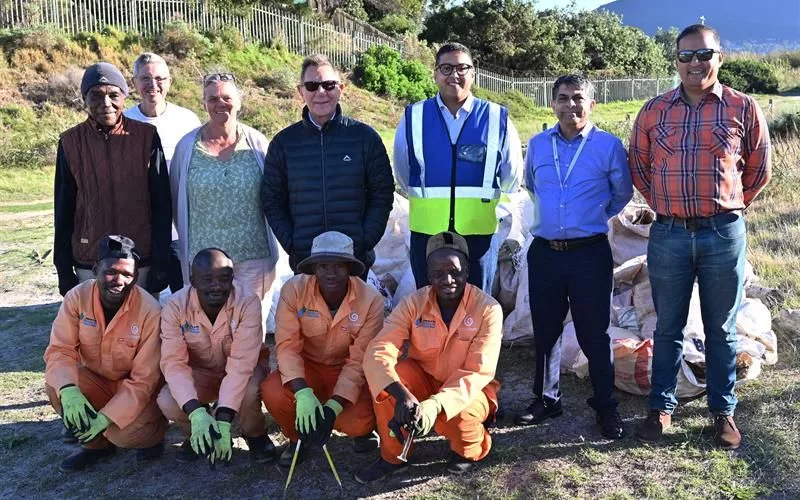Extortion has become a profitable way for criminal organizations to amass wealth in Cape Town, with a significant growth in the illegal extortion market due to the Covid-19 pandemic. Victims are often too afraid to speak out, exacerbating the situation. Cape Town has initiated several initiatives to combat the crisis, but a comprehensive approach is needed to restore faith and confidence in the city. Recent investigations have revealed the sinister reality hidden beneath the city’s scenic charm, with construction mafias posing a persistent threat to municipal projects.
A Deep Dive into the Rising Extortion Threat
In Cape Town, criminal organizations have found a profitable way to amass wealth through extortion. The illegal extortion market has significantly grown due to the Covid-19 pandemic, permeating a wide variety of businesses. Victims of this widespread extortion scheme choose to remain silent, primarily for fear of self-incrimination, thus exacerbating an already tangled situation. In response, Cape Town has initiated several initiatives to combat the crisis, but a comprehensive approach is needed to restore faith and confidence in the city.
A Deep Dive into the Rising Extortion Threat
In Cape Town, South Africa’s heart, a disturbing trend of escalating extortion threats is casting a shadow over the society’s fabric. A recent in-depth analysis has shed light on this growing criminal underworld, revealing how construction mafias pose a persistent threat to municipal projects.
This unsettling information came to light in a report titled “The Shadow Economy: Uncovering Cape Town’s Extortion Networks”. The report is a groundbreaking investigative piece by researcher Jenni Irish-Qhobosheane, associated with the Global Initiative Against Transnational Organised Crime. It reveals a sinister reality hidden beneath the city’s scenic charm.
In some areas of Cape Town, criminal organizations have found a profitable way to amass wealth through extortion. The report reveals that this sinister method of generating income can match, if not exceed, the proceeds from narcotics trade. The report also indicates a significant growth in the illegal extortion market triggered by the Covid-19 pandemic.
Extortion in the Time of Pandemic
The strict measures implemented in 2020 to minimize the virus’s spread inadvertently ignited a rise in extortion activities. Initially, tight curfews and temporary business shutdowns made it challenging for gangs and extortionists to operate. However, they quickly adapted and, as restrictions gradually softened, extortion activities intensified, permeating a wide variety of businesses.
Victims of this widespread extortion scheme ranged from small local stores and vibrant nightclubs to construction agencies, transport companies, and regular citizens. One disturbing highlight of the report is that victims frequently choose to remain silent about these crimes, primarily for fear of self-incrimination. In essence, acknowledging the crime implies yielding to the perpetrator’s demands.
Moreover, a pervasive climate of fear and intimidation discourages many victims from pursuing justice. This fear, combined with the acceptance of extortion as a business cost or a living expense in certain areas, only encourages the extortionists. Their demands grow in frequency and scale, exacerbating an already tangled situation.
Cape Town’s Response: A Multi-pronged Approach
In response to the escalating extortion crisis, Cape Town’s City has initiated several initiatives. These include launching an anti-extortion campaign and establishing a 24-hour dedicated hotline to report incidents.
The city’s strategies also incorporate enhanced security at multiple infrastructure sites. Measures such as armed escorts and additional protection for targeted city officials have been implemented. Probes into specific extortion economies have begun, with individuals linked to criminal networks being prohibited from conducting business within the city.
However, while the city actively battles the extortion crisis, victory is still far from sight. Untangling this intricate web of crime requires not only law enforcement efforts but also an in-depth comprehension of the socio-economic factors propelling this shadow economy’s growth. Only a comprehensive approach can enable Cape Town to liberate its streets from the clutches of extortion, restoring its citizens and businesses’ faith and confidence.
What is the extent of the extortion crisis in Cape Town?
There has been a significant growth in the illegal extortion market due to the Covid-19 pandemic, with criminal organizations finding it a profitable way to amass wealth. Extortion has permeated a wide variety of businesses, and victims often choose to remain silent, exacerbating the situation.
What is the cause of the rise in extortion activities in Cape Town?
The strict measures implemented in 2020 to minimize the virus’s spread inadvertently ignited a rise in extortion activities. Initially, tight curfews and temporary business shutdowns made it challenging for gangs and extortionists to operate. However, they quickly adapted, and as restrictions gradually softened, extortion activities intensified.
How has Cape Town responded to the extortion crisis?
Cape Town has initiated several initiatives to combat the crisis, including launching an anti-extortion campaign and establishing a 24-hour dedicated hotline to report incidents. Enhanced security measures have been implemented in multiple infrastructure sites, and probes into specific extortion economies have begun.
Why do victims of extortion remain silent?
Victims frequently choose to remain silent about these crimes, primarily for fear of self-incrimination. Acknowledging the crime implies yielding to the perpetrator’s demands, and a pervasive climate of fear and intimidation discourages many victims from pursuing justice.
What is the Shadow Economy report, and what does it reveal?
The Shadow Economy report is a groundbreaking investigative piece by researcher Jenni Irish-Qhobosheane, associated with the Global Initiative Against Transnational Organised Crime. It reveals a sinister reality hidden beneath the city’s scenic charm, with construction mafias posing a persistent threat to municipal projects. It also indicates a significant growth in the illegal extortion market triggered by the Covid-19 pandemic.
What is needed to combat the extortion crisis comprehensively?
Combating the extortion crisis comprehensively requires not only law enforcement efforts but also an in-depth comprehension of the socio-economic factors propelling this shadow economy’s growth. A comprehensive approach is necessary to enable Cape Town to liberate its streets from the clutches of extortion, restoring its citizens and businesses’ faith and confidence.












